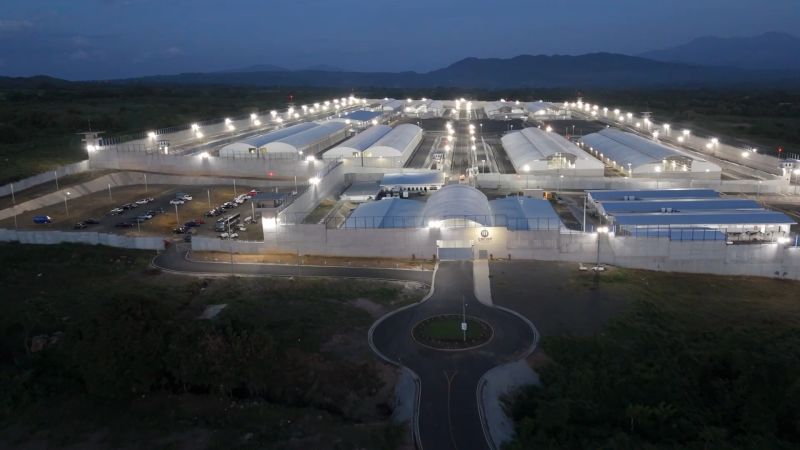García would not discuss any specifics around the deportees beyond confirming they are in his facility. But when pressed, he said “there are no privileges.”
Some 278 men have been deported by the Trump administration to El Salvador, accused of being members of the Venezuelan Tren de Aragua gang or Salvadorans who are said to be part of MS-13.
But they also include Kilmar Armando Abrego Garcia, a sheet metal worker and father-of-three from Maryland, who was mistakenly removed from the US through an “administrative error.”
His case is now with the US Supreme Court, which extended the deadline of a lower court judge requiring the administration to get him back by midnight on Monday.
García said he was not familiar with the specifics of any individual deportee and could not comment further.`
They are removed from their communal cell by armed personnel and taken to a room with video conference facilities. Monitors showed court proceedings in progress, apparently with lawyers and judges present.
Cecot houses both convicted criminals and those still going through El Salvador’s court system. With many constitutional rights suspended under El Salvador’s years-long state of emergency, some people have been detained by mistake, President Nayib Bukele has admitted; several thousand of them have already been released.
Where the lights are always on
Each of the eight sectors is fully self-contained with these conference rooms as well as a medical clinic, with the intention that inmates never step outside their warehouse-like building.
They are watched through the bars constantly and the lights are always on, García said. There are even guards on catwalks above the cells.
Looking down through the metal-grille ceiling into a cell, the deliberate harshness of the life for the Salvadoran inmates — whether convicted or awaiting trial — is clear. They are allowed no personal possessions; they must use an open toilet and there’s a cement basin for washing and large jug for drinking water.
Still, there are checks for contraband when the inmates are “extricated” from the cells. The men have their hands cuffed behind them and then run to sit in a designated spot, stretching their legs around those of the man in front in what becomes a human herringbone pattern.
When Secretary of Homeland Security Kristi Noem visited CECOT last month, she recorded a video message to say to undocumented immigrants in the US: “This is one of the consequences you could face.”
“First of all, do not come to our country illegally. You will be removed, and you will be prosecuted,” she said. “But know that this facility is one of the tools in our toolkit that we will use if you commit crimes against the American people.”
It is busier inside now, with more men in each cell.
Last year, García would say only between 10,000 and 20,000 inmates were being held. Now he says it’s getting closer to its 40,000 maximum population, but once again declined to give a specific number, citing security precautions. The growth would include the deportees from the US, but be mostly Salvadorans rounded up under the emergency situation introduced by Bukele.
A thousand or more armed guards rotate duties at the prison, built in just seven months and opened in January 2023. The prison is also ringed by multiple electric fences and 19 watchtowers.
For critics, Cecot is a sign of how quickly rights can disappear. But for many in El Salvador it is proof of effective control and a return to security in what was once the “murder capital of the world.”
